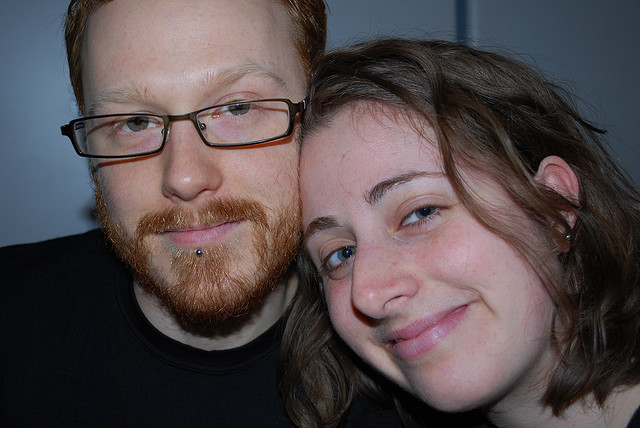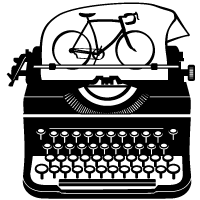
Jetlagged in Glasgow at the very start.
A few years ago, Tyler Kellen had the sort of hair-brained scheme that many cyclists have: set off on a tour around the world. He started asking his then-girlfriend now-wife Tara Alan if she would join him and eventually she said yes. Flash forward to April 2009. The Minnesota duo flew to Scotland and set off on a trip that’s taken them all over Europe, into northern Africa, across Russia, and into South East Asia where they’re currently riding and exploring. Tara and Tyler have thoroughly documented their trip with journals, photography, and audio recordings on their website Going Slowly (to which they link extensively throughout the interview). I spoke to them about the experience of undertaking such an immense journey, their reception abroad, and how a tour like this has influenced their life plans.
How do two ordinary folks who ride bikes, but couldn’t necessarily be called avid cyclists end up as worldwide cyclo-tourists on a two year adventure?
In a nutshell, we wanted to travel the world, and thought a bicycle would be an inexpensive and engaging way to do it.
Tara: I had scarcely ever ridden bikes (or camped!) before we left. Tyler, on the other hand, was an avid motorcyclist who was very comfortable riding heavy two-wheeled vehicles. He was so encouraging that eventually I started to believe it was possible for people to bike across countries and moreover, that I could do it too. This was before I even knew there was such a thing as bicycle touring!
Tyler: I think the best answer to this question can be found in our journal, under an entry entitled “How We Did It”, which outlines the broad steps we took from the inception of this idea to the day we left.
By my count, you’re currently in your 21st country of the tour. Do you have a favorite out of all of them?
This is such a difficult question to answer! So far, we’ve found at least a few things to love in every country and equally, little things to be annoyed by. It would be impossible to pin down any single place as the best so here are a few thoughts about some of the more memorable ones.
We loved Italy for the sumptuous food (it really is as good as everyone says), friendly people, picturesque towns and villages, and easy free camping. Add to this the relaxing pace of life and we’re all but certain we will visit again.
Being in rural Romania was like time-traveling 200 years into the past. We rode through gypsy villages, up misty mountains, over rutted muddy roads, and through freezing cold rivers. Along the way, we met farmers and woodsmen, people selling hand-made copper pots by the roadsides, shepherds and all sorts of other friendly people. It was also full of free-camping opportunities in some truly remote, wild locations.
Russia was a pleasant surprise. We were filled with negative stereotypes about how it was going to be ugly, mean, and full of concrete. It turned out to be anything but! Siberia especially, with its reserved but kind people, decorative wooden houses, and wide open spaces, won our hearts. The Altay mountain range winding its way towards the Mongolian border was unquestionably the most awe-inspiring display of nature we have ever seen.
Mongolia was an empty, haunting beauty and a land of extremes. We experienced both blizzards and scorching desert heat, green mountains, and sand dunes. Though we got a bit weary of mutton and sheep fat by the end of our time there, experiencing the enormous skies, stretched landscapes, and hardy, rosy-cheeked people was the adventure of a lifetime.
Most recently, Cambodia took the crown for the most heartwarming country we’ve been to. It is full of radiant smiles and welcoming people. The kids are the cutest you’ve ever seen, and everyone is just so dang friendly. From the daily comings and goings of little roadside villages and rice paddies, to tourist attractions like the temples of Angkor, this country never ceases to be engaging.

Tara chatting with a Tunisian shepherd.
What is the reception of two relatively-young American travelers on a global tour?
Overwhelmingly positive. No matter where we’ve gone, the fact that we are American has never been a topic of much discussion with the locals. On the very few occasions people had something to say about our home country, it went along the lines of: “Bush bad, Obama good.” We tend to agree with the sentiment, even if the Obama administration has been a bit of a disappointment to us thus far.
Obviously you have Internet and phone access, but there still must be some disconnect from the news and politics back home. Is that disconnect frustrating or is it a blessing not to be mired by the daily ups and downs of America?
We didn’t really feel mired by the daily ups and downs of our country when we were at home and we certainly don’t feel it now. We do follow the news, but it is generally with bemused detachment.
Any tips for wanna-be bike tourers?
It doesn’t matter if you go for a single day or a whole year, at home or abroad–just stop being a wanna-be and go do it! You will never be prepared “enough,” but it won’t matter once you’re out there. The biggest step is quite literally to pedal off and trust in yourself to learn what you need to along the way.
Don’t measure the value of your adventure against the travels of others, and don’t let anyone tell you what the “right” way to tour is. The point is to get out there and do it. Lastly, don’t feel guilty if you go very slowly and stop often!
For practical, step-by-step touring advice for beginners, we recommended this free e-book written by Friedel Grant of the Travelling Two.

Field testing those Ortlieb panniers in Thailand after a flood.
Now that you’re getting close to the end of your trip, have you started thinking about your post-Going Slowly plans?
Happily, there will be no post-Going Slowly; our website will evolve with us as we move on to new things–it is the scrapbook of our lives! Eventually, we will split the site into clearly defined sections, one for each of the major projects we’ve undertaken. Going Slowly is a philosophy that fits with our worldview on or off the bikes.
That said, we’ve been thinking about our post-bike tour plans since before we even started this trip! Now, as we near the end, we talk about it constantly. First, we’re going to spend some significant time with both of our families. Then, we hope to buy a small piece of land to settle on. There, we’ll document the creation of our homestead, from building a cob house and raising chickens, to keeping bees and growing fruits and vegetables. We plan to record the process just as we have our cycle tour, learning each step of the way.
How does a long tour like this change a person’s outlook on life? What did you see yourself doing life or career-wise before the trip and what do you see yourself doing now?
Tara: Before we left, I was really unfocused. I wanted to be everything from a French teacher to a puppeteer to a baker. I’ve definitely learned discipline and how to handle hard work thanks to our cycling and daily writing. Over the course of authoring some four hundred-odd journal entries I’ve discovered my vocation: being a writer.
I plan to continue working on Going Slowly and I have a few book ideas that I’ll get started on once our tour is over. I also can’t wait to settle down, build our own home, cook on a real stove again, and someday, take care of a menagerie of animals.
Tyler: One of the biggest changes this trip has brought about in my worldview is an acute consciousness of the rapid passage of time. A year is not very long; nor are the lifetimes they fill. Naturally, this has forced me to get really clear about what matters and what doesn’t. Everything we do takes time!
Career-wise, my software development business will most likely continue to be our primary source of income for many years to come. I have a small enough client base that I can support it exceedingly well on my own. The resulting loyalty provides enough income for us to do the things we care about, without it completely taking over my life. I no longer have grand dreams of being a millionaire. I have exactly enough now.
Very long term, we’ve been talking about starting an aid organization of some kind. There are no shortage of problems in the world that need a champion.

